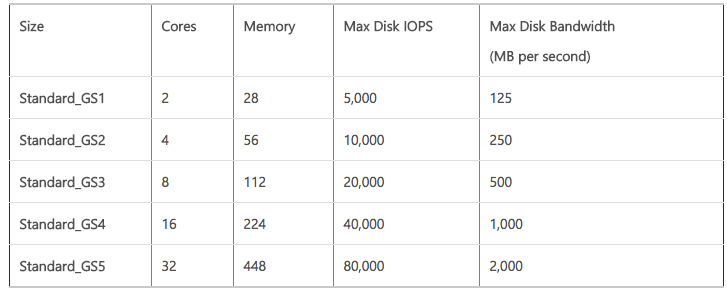Microsoft is announcing a couple of updates to its Azure cloud computing service today that, among other things, include the launch of a new variant of its performance-optimized G-type virtual machines (VMs) and price cuts for its compute-centric D-type VMs.
Azure’s G-class VMs are Microsoft’s highest-end machines in the Azure cloud — and hence also its most expensive. Running Windows, those VMs top out at $7,180/month. Now, Microsoft is launching a variant of these machines (GS) that adds premium storage as an option. GS-series VMs can feature up to 64TB of storage and offer up to 80,000 storage I/Os per second with up to 2,000 MB/s of storage throughput.
Both the standard G-series and new GS-series VMs will now also support 20 Gbps of network bandwidth. According to Microsoft, that’s double the throughput of any other VM offered by its competitors.
As Microsoft’s director of program management Corey Sanders told me, the company decided to add this premium storage options because of customer demand. Azure users want to use the G-series machines to run big database workloads.
“As those workloads have grown, the desire for increased storage throughput has come up regularly,” he told me. In his view, the GS-series VMs are ideal for running databases like MySQL and Microsoft’s own SQL Server, as well as noSQL databases like MongoDB.
Sanders also notes that some of Azure’s customers are looking at these machines for powering their data warehouses and enterprise applications like Exchange and Dynamics.

With this update, Microsoft is also cutting the prices of its D-series VMs, which are typically used for powering web application frontends and basic data-tier workloads, by up to 27 percent. Sanders told me the idea behind the price cut is to drive more users to the D series as they move their production loads to Azure. The price changes will go into effect on October 1.
Azure now also features a premium tier of its Service Bus messaging service that gives developers a higher guaranteed uptime and more predictable performance, as well as new diagnostic capabilities for VMs.
